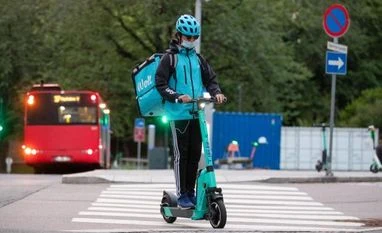DoorDash Inc.’s shares soared 17% as the market opened on Wednesday, after the biggest meal-delivery service in the U.S. said it’s buying Finnish food-delivery startup Wolt Enterprises Oy for about $8 billion.
The all-stock deal is DoorDash’s biggest purchase to date, eclipsing the acquisition of Caviar in 2019. It’s the latest merger in the quickly consolidating food-delivery market, which has benefited handsomely during the pandemic, but where profits are elusive. Last year saw Europe’s Just Eat Takeaway.com NV buy Grubhub for $7.3 billion while Uber Technologies Inc. snapped up Postmates Inc. for $2.65 billion.
Doordash, which also posted third-quarter results that beat analysts’ estimates, is seeking to stay ahead of rivals in the race to satisfy soaring demand for fast delivery of everything from food to prescriptions and pet supplies.
Read More: Wolt’s $8 billion DoorDash sale is one of Finland’s biggest deals
Despite its meteoric rise in the U.S., DoorDash has been slow to expand internationally. The company’s first foray outside of North America was to Australia in 2019 and most recently Japan in June. San Francisco-based DoorDash has been searching for a way into the competitive European market dominated by players like Just Eat Takeaway, Deliveroo Plc and Germany’s Delivery Hero SE.
“This partnership is really about acceleration and expansion to play for a bigger prize on an even larger global stage,” said Tony Xu, co-founder and chief executive officer of DoorDash, in a conference call with analysts Tuesday.
DoorDash shares jumped to an intraday high of $224.80, the biggest increase since May 14. The move brings gains this year to as much as 55.8%, valuing the company at about $75 billion. DoorDash is closing the gap with Uber, which has seen its shares decline 12% this year to a market value of $87 billion.
While DoorDash’s growth in the U.S. has been largely organic, the company has taken a different approach to entering the crowded Continental market. It’s leading a fundraising round in German grocery delivery startup Flink SE after talks with Gorillas Technologies GmbH fell through in August.
“DoorDash was late to the game expanding internationally,” said Tom White, an analyst at D.A. Davidson. “Then again, they entered the sector somewhat late in the U.S. too and their playbook proved successful, so never say never.”
Founded in 2014, Helsinki-based Wolt operates in 23 markets across Europe, 22 of of which will be new to DoorDash and expand its footprint to 700 million customers, Xu said. Wolt has focused on mid-tier markets, branching out from Helsinki to places like Stockholm and Tel Aviv. In 2020, the company entered Berlin and Tokyo. However, even with Wolt’s reach, DoorDash will still be absent from the U.K., where Uber launched in 2016.
“Wolt has a massive runway ahead and our partnership is setting the foundation for our international growth,” Xu said in an interview.
Wolt, which has 4,000 employees, raised more than $800 million from investors, including $530 million in January led by Iconiq Growth. PitchBook valued Wolt at $3.61 billion after the funding round. The company was preparing for a potential stock market listing next year. At the close of the acquisition, expected in the first half of 2022, Miki Kuusi, Wolt’s co-founder and CEO, will run DoorDash International, reporting to Xu.
Like DoorDash, Wolt has has expanded services beyond restaurant takeaway to delivering groceries and retail goods like pharmaceuticals. DoorDash has launched services across grocery, alcohol and pet supplies to capitalize on the shift in consumer behavior and hedge against a deceleration in pandemic-level growth. It’s bolstered partnerships with retailers like Bed Bath & Beyond Inc. and Ulta Beauty Inc. to provide same-day delivery for orders placed on their websites through its white-label product Drive.
“DoorDash and Wolt share a vision to build a global platform for local commerce that empowers the communities we operate in,” Xu said.
During the pandemic lockdowns, DoorDash quickly established itself as the dominant platform, commanding 57% of all food delivery sales in the U.S. as of September, according to Bloomberg Second Measure. Even as cities reopen and rising vaccination rates encourage people to return to in-person activities, customers’ craving for the convenience of ordering online hasn’t abated. DoorDash customers placed 347 million orders in the third quarter, a 47% increase from a year earlier, with the gross value of those orders at $10.4 billion.
Wolt, which has more than 2.5 million active users, has gross order volume of more than $2.5 billion on an annualized basis, according to an investor presentation.
While demand is clear, DoorDash and Uber have both been chasing profits. In third-quarter results released Tuesday, DoorDash showed its net loss widened to $101 million from a loss of $43 million a year earlier.
Uber reported its first-ever adjust profit in the third quarter, helped by Uber Eats, which boomed during the pandemic and helped offset a cratering of demand for ride-hailing. The company said last week that the delivery segment, which includes orders across restaurant, grocery and alcohol, has continued to grow despite indoor dining resuming, up 50% from a year ago to $12.8 billion in bookings.
DoorDash said the Wolt deal is expected to be accretive to gross order volume growth next year. It expects pro-forma combined adjusted earnings before interest, tax, depreciation and amortization to range from $0 to $500 million in 2022, the company said in a statement.
Unlock 30+ premium stories daily hand-picked by our editors, across devices on browser and app.
Pick your 5 favourite companies, get a daily email with all news updates on them.
Full access to our intuitive epaper - clip, save, share articles from any device; newspaper archives from 2006.
Preferential invites to Business Standard events.
Curated newsletters on markets, personal finance, policy & politics, start-ups, technology, and more.
)